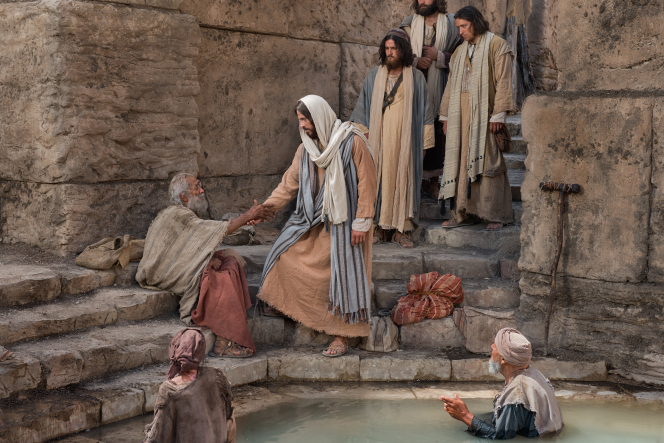Ministering—it’s a word that, thankfully, most of us don’t use very often and so we can’t attach a sudden meaning to it other than a sense of service or religious work. It’s a word we have to think about, ponder, and look up. And, through the revelation of a prophet, this is what members of the Church of Jesus Christ of Latter-day Saints now do instead of home teaching and visiting teaching.
From what Elder Holland and Sister Bingham taught in their messages, we know the Lord is asking us to drop our Law of Moses approach to what should have always been an act of ministering, but had traditionally become an item to check off a list and document in percentages. For so long, always wanting a measurable way to know if we’ve done our part, as a church, we’ve sometimes turned visiting teaching and home teaching into a numbers game. We’ve frequently made it about us, about checking it off a list, about a way to measure our activity in the Gospel. Well, it’s to be that way no more. God is raising the bar, slowly, for all of us.
The phrase that stuck out to me as this historical organizational change was preached is, “It will not be about you, but about them.”
Ministering is About Following the Spirit
Ministering is not about a checklist or a line to avoid stepping across. It’s first and foremost about learning to follow the promptings of the Holy Spirit. Think of late President Monson. No man ministered more than he and the key to his ministering was following the promptings of the Spirit. Following the Spirit was more important to him than anything else, and it was this spiritual strength that he had that we applauded so much. He was a Christlike example of ministering.
If you google the word “ministering” (verb) you get the following definitions:
- Attend to the needs of someone
- Provide something necessary or helpful
- Act as a minister of religion, meaning to: tend to, care for, take care of, look after, nurse, treat, attend to, see to, help, and assist
Ministering means, more or less, to be a servant. And, in our case, we need to be inspired servants.
We can’t attend to needs we are unaware of. We can’t be on call for someone who doesn’t trust us or think of us when they have troubles. We can’t provide necessities and helpful acts of service if we don’t have a foundation of friendship upon which to offer them. We can’t care for look after, attend to, or assist people we know nothing about or whom we know only as distant acquaintances and ward members.
Ministering is a whole new level of service that must come from the heart. No heart. No ministering. It means we can’t coast with a disconnected effort and expect miraculous results. It means we are going to have to “tune in” to the lives of others in a deeper, more honest way, so that the Holy Spirit can guide us on the love they most need and the service that will best touch their lives. We’re going to have to become a great deal less self-concerned and a whole lot more self-less.
Home teaching (HT) and visiting teaching (VT) should have always come from the heart. And, I’m certain that for many people, it did. HT and VT should have been a catalyst for ministering. And, for some it was. My testimony of HT and VT came because of a few examples where I was actually ministered to, not simply visited and taught. I’ve had sisters do things that I needed because they were thinking about me, and worried about me, not checking their visit off a list. Their actions then became lifelines to my desperate soul during desperate times. They saved me. I’ve also had home teachers provide for my family in dire need because they paid attention to our needs, and because they had the means to bless us personally. They didn’t think twice about our want, they simply filled it—anonymously, though we puzzled it out. They didn’t just visit and deliver a message. They paid attention. They ministered.
So my testimony of these callings has always been based on ministering experiences that came because of them, not on the calling itself. I have a strong testimony of ministering.
So again, I repeat the phrase that touched my heart, “It will not be about you, but about them.”
Here is the doctrine of ministering. When we make our service about us, then the Spirit cannot help us. When we make our service about others, then the Spirit can get involved. If our only goal is to check something off a list and say we got it done and comfort ourselves regarding our own righteousness, then the Spirit is handicapped in His ability to inspire us how to minister to others. But, if our goal is to do anything, whatever another may need in any way, and we focus our time and energies on discovering those things, the focus drops from us and moves to those for whom we are to minister. Suddenly, the Spirit can work with us and get involved.
(Interesting that we were reminded a great deal about how to learn from and access the gift of the Holy Ghost during this conference. Not a coincidence, I think.)

Ministering is About Flexibility and Consecration
In a very literal Sermon-on-the-Mount-type addresses, God told us all through a prophet that checking a visit off a list is a lesser law. “Do not even the Publicans so” (Matthew 5:47)? He is asking us, very pointedly, “Lovest thou me?” And, if we answer, “Yes,” then He is saying very pointedly, then, “feed my sheep.” (St. John 21:16-17)
That’s the command. “If ye love me, keep my commandments” (John 14:15). And, God isn’t going to give us a one-size-fits-all meal or message.
He isn’t going to tell us how many days to minister. He isn’t going to give us a minimum or maximum on how much love to show or how often to try to touch base. There are no limits to love, are there? God is asking us to love truly from here on out. God is asking us to pray, to ponder, to seek, and to be guided by His Spirit on how to bless the lives of those to whom He gives us stewardship.
Our time, our talents, our resources…everything with which the Lord has blessed us and with which He may bless us…is going to come into play here. I feel that very strongly. Ministering requires meekness (a topic we also learned a great deal about in Conference). Ministering requires a willing heart, and a consecrated heart.
So, what’s the doctrine here? It’s that if we adhere to a rigid idea of what ministering is then we are closed to inspiration and guidance from the Holy Ghost. If we are looking for a checklist, then we are not going to be flexible. We can’t be taught or inspired if we come up with a fixed formula for service and love. We can’t copy others. We must tailor our efforts to the needs of those to whom we are given stewardship. That will always require access to the Holy Spirit and an unlimited ability to be prompted to help in whatever way we are impressed. We can’t close our minds to what might be needed or asked of us.

Ministering is About Ultimate Family and Church Unity
And the Lord Called His People Zion because they were of one heart and one mind, and dwelt in righteousness; and there was no poor among them. (Moses 7:18)
I suspect that this higher law of Ministering is going to require a whole lot more of members of the Church of Jesus Christ of Latter-day Saints that we yet realize. Our goal is not simply to be a little bit better at serving (though that’s a good start and we have to start somewhere). Our goal is to be of one heart and of one mind. Unity in the church is not simply a nice idea. It’s essential as we prepare the earth for the second coming of the Savior. It’s essential as we fulfill the role of our dispensation to take the Gospel to every corner of the earth. It’s critical in our mission to gather Israel.
The church has gone through many changes in the last twenty years. But, note that none of those changes are in fundamental doctrines. The doctrines have never changed. The vast changes are taking place in our application of the fundamental doctrines we espouse. The changes are taking place in how we teach, serve, and build the kingdom. The changes are taking place in small ways as the Lord slowly helps reach a pinnacle of unity that the world has never before seen. We must become more unified to accomplish its mission. And that unification will come as we are all more individually one with Christ.
As a worldwide church, we are better learning how to love the sinner without condoning the sin. We are better learning how to accept people where they are. We are better learning how to hold true to our doctrines without looking down our noses at other religions. We are better learning how to seek out common ground in beliefs with others and finding unity in those common beliefs. We are better learning to understand covenants and promises and how to keep them. We are better learning how to deal with addictions and mental disorders. We are learning to have more charity and to love as Christ commanded us to love… “even as I have loved you” (John 15:12).
The list just keeps going. We ARE getting better…but WE AREN’T THERE YET.
In Doctrine and Covenants it 38:27 says, “I say unto you, be one: and if ye are not one ye are not mine.”
How to Tell if We are Ministering and Not Simply Teaching or List Checking
The Spirit is unrestrained when there is unity. If we would have something to measure ourselves by in this new Ministering challenge, we can measure our success by the amount of unity we achieve in our families, quorums, auxiliaries, groups, branches, wards, stakes, regions, countries, and in the church. The church must stand together, whole and well, if it is to rise to its prophesied stature for these Last Days.
How to Learn How to Minister
Doctrine and Covenants 97:18-21 says, after encouraging the saints to build a temple that the members might be perfected in the understanding of their ministering:
And, now, behold, if Zion (meaning the membership of the church) do these things she shall prosper, and spread herself and become very glorious, very great, and very terrible. And the nations of the earth shall honor her, and shall say: Surely Zion is the city of our God, and surely Zion cannot fall, neither be moved out of her place, for God is there, and the hand of the Lord is there…
If we want to better understand ministering, we should make ourselves worthy of, and attend the temple frequently. One of its purposes is to help us be perfected in the understanding of our ministering. Just thinking about what we must do to enter the temple and minister for ourselves or for those who are dead tells us a lot. We:
- Remove the world from our bodies and lives
- Unify ourselves in dress and appearance that we are not distracted by class, rank, titles, wealth, etc.
- Meet together in reverence
- Focus on the eternal salvation and exaltation of ourselves and others
- Seek personal revelation, guidance, comfort, reassurance, knowledge and confidence in God’s will for us
- Do for others that which they cannot do for themselves
- Communicate with love, humility, and reverence
- Focus on being saviors of others, to do what they cannot do for themselves
- Focus on eternal family, both ancestors, present family, and our posterity
All of the above are also critical for being worthy and able to receive spiritual guidance as we seek to minister to our brothers and sisters outside of the temple. Simple visits with usually well-meaning and well-thought out messages? A bygone thing. A lesser law, even despite its goodness. Constant personal revelation for ourselves and on behalf of those to whom we are given the stewardship to minister? A higher law, a true Christian law, a celestial law.
The celestial kingdom is governed by the law of Christ. Christ didn’t merely visit and recite a message. Christ ministered. If we would learn to minister, we must study the life of the Savior and seek to emulate Him. We must pray for gifts of the Spirit. We must filter the good and better from our lives and seek only the best. We must rise up and meet the challenges of our day without fear, and with an outpouring of love.
Ministering. Yes, we can do this!
BT





Leave a comment